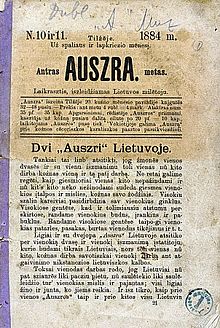Ausra; Varpas (Lithuania): Difference between revisions
No edit summary |
No edit summary |
||
| Line 7: | Line 7: | ||
====Medium: [[:Category:Print Journalism|Print Journalism]]==== | ====Medium: [[:Category:Print Journalism|Print Journalism]]==== | ||
---- | ---- | ||
[[File:Ausra.jpg|right]] | |||
'''Artist:''' Lithuanian writers, journalists, religious groups | '''Artist:''' Lithuanian writers, journalists, religious groups | ||
| Line 14: | Line 15: | ||
'''Location:''' Lithuania | '''Location:''' Lithuania | ||
'''Description of Artwork:''' Any publication written in the Latin alphabet, specifically the newspaper, Ausra, which printed social, cultural and historical stories. <P> | '''Description of Artwork:''' Any publication written in the Latin alphabet, specifically the newspaper, Ausra, which printed social, cultural and historical stories. <P> | ||
Revision as of 20:48, 24 December 2011
Date: 1883 - 1886 1889 - 1905
Region: Russia and Central Asia
Subject: Language Racial/Ethnic
Medium: Print Journalism
Artist: Lithuanian writers, journalists, religious groups
Confronting Bodies: Imperial Russian Authorities
Dates of Action: 1883-1886, 1889-1905
Location: Lithuania
Description of Artwork: Any publication written in the Latin alphabet, specifically the newspaper, Ausra, which printed social, cultural and historical stories.
The Incident: During the 1880s Russia tightened control of its imperial holdings in Eastern Europe. One of its edicts was the abolition of the Latin alphabet. As a result, the newspaper, Ausra (Dawn), began publishing clandestinely in Prussia. Members of the Lithuanian community smuggled it across the German-Lithuanian border, risking significant prison sentences. Russia feared it could incite nationalist movements throughout the empire by uniting nations that were denied their native languages, such as Ukraine, Belarus, Armenia and Georgia.
Results of Incident: Although it was never free to publish in Lithuania, Ausra evolved into the periodical, Varpas, that played a major role in Lithuanian independence, eventually won in 1918.
Source: Censorship, A World Encycylopedia, ed. D. Jones
